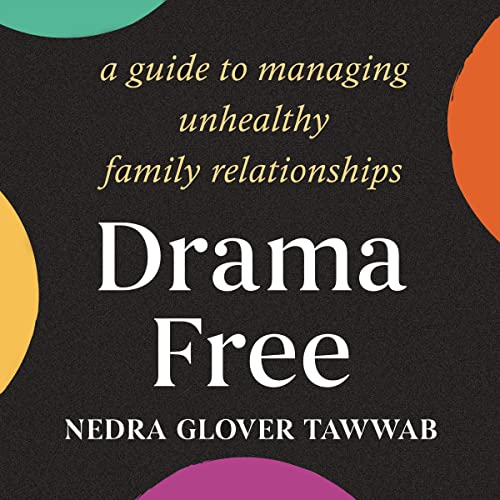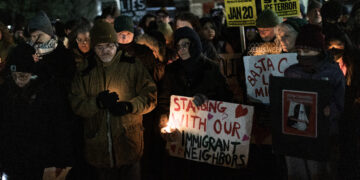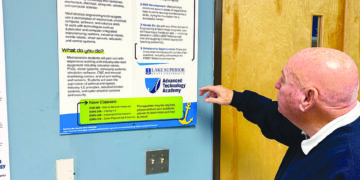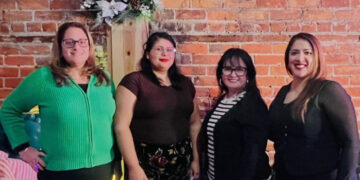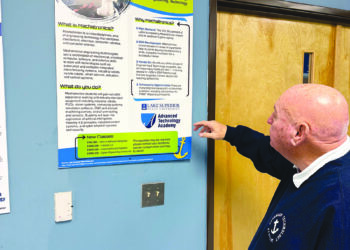On March 11, 2023, 27th Letter Books, located on the border of Southwest Detroit, hosted a presentation by The New York Times bestselling author, Nedra Glover Tawwab. Ms. Glover is a mental health therapist and author of two bestselling books, Drama Free and Set Boundaries, Find Peace. Ms. Glover Tawwab is from Detroit and graduated from the Detroit Public Schools. She is a graduate of Wayne State University and currently resides in North Carolina.
Irma Guzman and Helena Solano had the opportunity to interview Ms. Glover-Tawwab when she visited Detroit. Ms. Guzman and Ms. Solano are mental health professionals in Southwest Detroit and strongly believe in the healing that can come from being open to mental health and the possibility of change. This interview has been edited for length.
Q: How do you encourage people to seek help?
Nedra: For me as a therapist, therapy is the first stop. Many people are not ready to go to therapy so I suggest certain books or sometimes follow particular therapists online.
Q: What would you say to families that want to make changes for the better, how do they start?
Nedra: Start where you are most comfortable because everyone is not ready to go to therapy. Sometimes it is reading a book, looking up articles online, or looking at videos and beginning with small steps of change. When you are ready to make a bigger step, then it’s going to therapy; but that is not the first step for most of us.
Q: What was the spark behind writing books about boundaries and families?
Nedra: I took a cue from my clients. When they would come see me, they would be scrolling in the lobby, and I thought wow, this could be a really nice way to reach more people. And from there it really took off. As I was on the platform, I was talking more and more about boundaries and people were so shocked like OMG, what is this–I’ve never heard of this. And it made me think, oh this is stuff I talk about all the time with my clients so I knew it was something that is needed.
The focus of Drama Free, I wanted it to be on managing unhealthy relationships. What I’ve learned is not everyone wants to leave. Most people don’t want to leave. It is really about helping people to accept their family members, and to figure out how to be in those relationships and not trying to make those people any better because we really can’t.
Q: When you look at Detroit, from a mental health point of view, what do you see? How would you encourage people to move forward in the area of community mental health?
Nedra: I would love to see mental health taken into non-traditional spaces, like maybe barber shops or nail salons, more in schools, more in churches, in different spaces. I think it would be wonderful if people in communities, especially in cultural communities, be it the Hmong community, the Hispanic community, if someone from/in the community could be trained because those are communities that might not seek out those services but they have a trusted member in the community that could be of help. There was a program in Africa that did that. Where they trained women in the villages, not to be therapist, but to be able to recognize depression, suicidal thoughts, and all these other things because in that culture no one is going to a therapist. So we have to have more trained professionals that aren’t actually therapists but that connect people to resources, because in many cases they are already doing it. They just need more tools.
Q: What starting points would you give to young women in their teens who are cycle breakers in their families but may still rely on their families for support in other ways?
Nedra: Develop a plan of action to get out. I think there has to be a clear path forward. Whether that is working to save up money, taking classes, finding mentors, do all of those things while you are still under age. It does pay off. You will only be under your parents’ thumb, hopefully, for 18 years. On your 18th birthday after you’ve done all this preparation there is an opportunity for you to go to college, start working, and build that family outside of maybe the dysfunctional one that you have. There are just so many opportunities. I think sometimes we look at situations and say “Ugh my family is terrible, I just have to stay here”, when you can start preparing for it and planning to leave.
On helpers and chosen families:
Nedra: Sometimes we don’t recognize our helpers because they are there. We tend to have a very heavy focus on who is not present for us. It is not the mom, but it is the neighbor down the street, it is not my dad, but it is my uncle showing up. There does have to be more of a focus on who is here instead of who is not. We do have those surrogate relationships and we could be leaning into those a bit deeper and getting what we need.
Editor’s Note: Help is available for people in crisis. If you or someone you know need help, call the Suicide Prevention Hotline at 988 (24/7 services in English or Spanish) or send a text to 988 or chat in English at www.988lifeline.org. In addition, the Detroit Wayne Integrated Health Network (DWIHN) operates a 24/7 Access Helpline at 800-241-4949.
